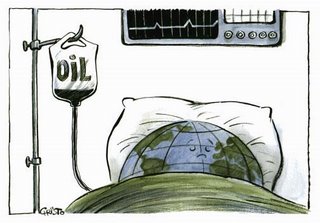
by Christo Komarnitski, Sofia, Bulgaria
Cartoons from the Bulgarian newspaper "Sega" -- Visit Christo's site
as seen on Cagle's Cartoons
over the barrel of peak oil

For years to come, we'll be paying for our oil in both treasure and blood, as we fight and parley to keep ever-tighter supplies flowing our way.and concludes:
The U.S. lives in an energy trap. We fell into it gladly, dug it deeper and sit fat and happy, with blinders on. We're fed daily meals of imported oil, from countries we pay in IOUs and think we can push around.
Unfortunately, we're investing in war, not in crash projects to develop new energy sources. Maybe there's time to spare. But some events, like true civil war and collapse in Iraq, could change everything in a day. We're running a faith-based energy policy—still addicted to oil. If something goes wrong, it will go wrong big.This comes from a writer known for her careful and sober counsel. See also her later piece, What We Need Is Policy.
For each unit of energy expended to turn cane into ethanol, 8.3 times as much energy is created, compared with a maximum of 1.3 times for corn, according to scientists at the Center for Sugarcane Technology here and other Brazilian research institutes.As I stated before regarding another article, the N.Y. Times claims that Brazil is oil-independent because of its development of ethanol; that begs the question of how much energy was needed to produce the ethanol and other concerns. Further as another article points out:
Gasoline with or without MTBE can be shipped in large quantities through an extensive network of pipelines. But ethanol, which tends to corrode pipelines, must be transported on trucks, trains and barges in relatively small batches to storage terminals where it is then blended with gasoline.